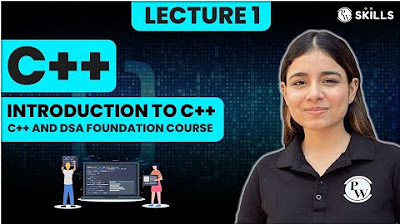Functions in C programming in Hindi 01 | Type of function | Library & User defined function
Summary
TLDRIn this video, the speaker introduces the concept of functions in C programming. They explain the two main types of functions: Library Functions, which are pre-defined and ready to use, and User-Defined Functions, which programmers create for specific tasks. The speaker discusses the syntax of a user-defined function, including its type, name, parameters, and body, offering an example of how to write and use such functions. The video aims to provide viewers with a foundational understanding of functions in C, preparing them for deeper exploration in future lessons.
Takeaways
- 😀 A function in C programming is a group of statements that perform a specific task.
- 😀 Functions are used to organize code and make programs more efficient and modular.
- 😀 There are two main types of functions in C: library functions and user-defined functions.
- 😀 Library functions are pre-defined and available in C, like `printf` and `scanf`.
- 😀 User-defined functions are created by the programmer for specific tasks that are not covered by library functions.
- 😀 A user-defined function typically includes a return type, a function name, and parameters.
- 😀 Functions in C can either return a value or perform an action without returning anything.
- 😀 A user-defined function can be created by specifying its type, name, and a parameter list.
- 😀 Library functions, such as `print` and `scanf`, are pre-defined and can be used directly in C programs.
- 😀 User-defined functions give more flexibility, allowing the programmer to define custom operations for specific needs.
- 😀 The tutorial will continue to explore different types of functions and their uses in upcoming videos.
Q & A
What is a function in C programming?
-A function in C is a group of statements designed to perform a specific task. It allows for reusable code, making programs easier to manage and debug.
What are the two main types of functions in C?
-The two main types of functions in C are Library Functions and User-Defined Functions. Library functions are predefined, while user-defined functions are created by the programmer.
What are Library Functions?
-Library functions are predefined functions that are part of C's standard library, such as `printf`, `scanf`, etc. These functions can be used directly in any C program.
Can you give an example of a Library Function?
-An example of a library function is `printf()`, which is used to print output to the console.
What are User-Defined Functions?
-User-defined functions are functions that programmers create themselves to perform specific tasks. These functions are customized according to the needs of the program.
How do you define a User-Defined Function in C?
-A user-defined function in C is defined with the following syntax: `return_type function_name(parameter_list) { // function body }`. For example: `void printName() { printf('Hello, User!'); }`.
What is the role of parameters in functions?
-Parameters allow functions to accept input when called. These inputs can be used inside the function's body to perform specific tasks. For example: `void printMessage(char* message)` takes a message as a parameter.
What is the importance of return values in functions?
-Return values allow a function to send data back to the calling code. The return type of a function determines the type of data the function will return. For example, an `int` function can return an integer value.
What is the purpose of defining both library and user-defined functions?
-Library functions provide ready-made solutions for common tasks, reducing coding effort. User-defined functions give programmers the flexibility to create custom functionality tailored to the program's needs.
How does a function improve the structure of a C program?
-Functions help organize code into manageable sections, promote code reusability, and avoid redundancy. This makes the program more readable, maintainable, and easier to debug.
Outlines

This section is available to paid users only. Please upgrade to access this part.
Upgrade NowMindmap

This section is available to paid users only. Please upgrade to access this part.
Upgrade NowKeywords

This section is available to paid users only. Please upgrade to access this part.
Upgrade NowHighlights

This section is available to paid users only. Please upgrade to access this part.
Upgrade NowTranscripts

This section is available to paid users only. Please upgrade to access this part.
Upgrade NowBrowse More Related Video

Introduction to C++ | Lecture 1 | C++ and DSA Foundation Course

#15 C Functions | C Programming for Beginners

Learn C++ in 10 Minutes !! C++ Tutorial for Beginners

Object Oriented Programming Part 1 | C ++ Tutorial | Mr. Kishore

C++ programming, Void function, get input by reference, call function by value and by reference

Linguagem C - Aula 8 - Estude Structs (registros) em C (2022)
5.0 / 5 (0 votes)